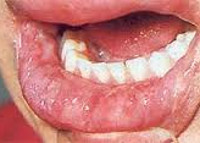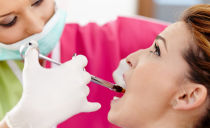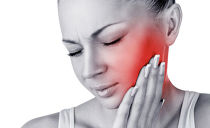Dry mouth in the morning, afternoon and at night: causes and treatment
When a person is sleeping, his salivary glands are less active. Saliva does not protect the tongue, cheeks, mucous membrane and gums from dehydration. For this reason, after the night, many feel a slight dry mouth - xerostomia. And it is worth drinking water, and the unpleasant symptom disappears.
But events do not always unfold so positively. Dryness may occur due to changes in the properties of saliva, insufficient production, intoxication of the body, impaired sensitivity of mucosal receptors, and even brain inflammation. Therefore, in cases where the symptom manifests itself often, you need to run to the clinic to undergo an examination and identify the cause of the disease.
Content
Features of the clinical picture
In addition to dry mouth, you can feel a burning tongue and throat, soreness. Observe redness, swelling, cracks in the corners of the lips. Food begins to stick to the sky. And if the secretion of saliva is reduced long enough, a white coating appears on the tongue, the gum tissue becomes inflamed and red, and ulcers form on the mucous membrane. The development of caries is not excluded.
Complications appear due to the growth of a population of opportunistic microorganisms. They live on human skin constantly, but are activated only under suitable conditions. One of these is the lack of saliva, which suppresses their activity.
Symptoms are not always pronounced. The degree of their manifestation depends on the severity of the disease. With the most mild form of discomfort, there is practically no, the shell of the mouth is slightly moistened. In the second stage, plaque appears in the mouth, the mucous membrane dries periodically, more often at night. Thirst and frequent urination can torment. The third degree is characterized by acute pain. The foci of inflammation on the mucosa are clearly distinguishable.
What is the danger
Saliva promotes the ingestion of food, washes off some microorganisms and naturally prevents tooth decay. When its production is reduced, the risk of inflammation of the mucous membrane, gums, and teeth increases. Thrush, stomatitis, chronic tonsillitis, gingivitis may develop. therefore with prolonged or frequent dry mouth, it is urgent to eliminate the cause of the pathology and to establish the salivary glands.
Why is my mouth dry
Xerostomia is a drying out of the oral cavity that occurs for one of three reasons:
- Due to insufficient moisture in saliva.
- Due to changes in the qualities of saliva itself.
- Saliva is secreted, but the body perceives the oral cavity as not moist due to a violation of the sensitivity of the mucous membrane.
Why dries after sleep
The appearance of dry mouth in the morning should not be scary. When a person sleeps, the glands practically do not produce saliva, and the facial muscles are weakened. Not everyone, but many people open their mouths. Air enters the mucous membrane, which is practically not washed by saliva. As a result, you may feel dry. The duration of the phenomenon is short: usually after washing, all unpleasant symptoms disappear.
The microclimate in the bedroom also matters. If it is too warm and dry, the tissues in the mouth dry faster and stronger.That is why it is recommended to place the bed at a distance from heating appliances.
Morning dry mouth is due to a cup of strong coffee, breakfast cereal. And in women, such a symptom can develop even against the background of menopause.
Why dries during sleep
Night xerostomia is explained in the same way. But also a symptom can occur against a background of a serious disease of the nervous system. When the salivary glands stop receiving signals that the oral cavity needs to be wetted. Therefore, dryness, which haunts from night to night and prevents falling asleep, should alert.
No saliva in the mouth: reasons
Dryness can be felt not only for an external reason (breathing with an open mouth, sleeping near a battery, snoring), but also because of internal pathologies:
- Dehydration. As with an elementary lack of water, and because of its rapid loss. The fluid leaves the body with prolonged diarrhea, vomiting, profuse sweating, for example, against a background of elevated body temperature.
- Diabetes. If xerostomia is accompanied by frequent urges in the middle of the night, then the diagnosis is obvious.
- Respiratory system diseases. A person more often breathes through the mouth, and not through the nose, which is why the mucous membrane can dry out. Nasal breathing is impaired with a common cold.
- Taking medication. Dry mouth can cause any medication. Especially those that provoke dehydration are diuretics and hypotensives.
- Diseases of the brain, central nervous system. Neuritis of the trigeminal branches, Alzheimer's disease, stroke is capable of upsetting the regulation of salivation.
- Intoxication. The abuse of alcohol, tobacco and drugs.
- Pathology of the gastrointestinal tract. The most obvious are gastritis, ulcers, hepatitis, pancreatitis.
Dry mouth
If the tissues dry out not only in the mouth, but also outside - this is the first sign of granular cheilitis. A disease characterized by a malfunction of the salivary glands on the border of the red border of the lips. Ailments are common among people over 30 years of age and older people. In 80% of cases, only the lower lip is involved in the pathological process.
Patients rarely consult a doctor in the early stages of cheilitis, as the symptoms at this point are mild. Then the ailment develops and the patient's health deteriorates sharply: the skin around the mouth is covered with erosion, the tongue becomes dry, the corners crack. The sufferer begins to lick his lips, which exacerbates the condition even more. The cracks come together and form one large wound. You can cure the pathology using surgical methods or laser therapy.
Dryness and related symptoms
Oral dehydration should not be considered alone. It is necessary to seek out those signs that accompany it. They are not always available, but with the availability and competent diagnosis, they help establish the true cause of dry mucous membranes and burning in the mouth.
Weakness
Tissues in the oral cavity constantly dry, a person quickly becomes tired and feels chronic weakness without the slightest gleam of vigor - such symptoms indicate the development of a serious pathological process in the body. It can be a viral, infectious or bacterial disease, external intoxication. And there are even worse reasons:
- Pathology of the nervous system.
- Anemia and other blood diseases.
- Oncological diseases.
Weakness can be a sign of any ailment. Therefore, such a symptom, provided that it manifests itself unreasonably and over a long period of time, requires immediate medical attention. Moreover, if chronic fatigue is accompanied by very severe dry mouth.
Nausea
Dryness and nausea are combined often. Usually they are combined for food poisoning and intestinal infections. And appear before the main symptoms - bloating, vomiting and diarrhea.
Nausea and dry mouth are not always signs of the disease.The basis for their occurrence may be banal overeating or too high-calorie nutrition after a strict diet.
Whitish film on the tongue
Dry mouth, mucus, 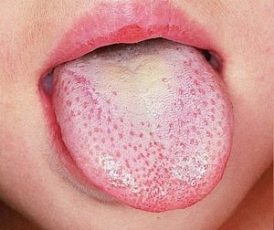 , which can not be removed, may indicate diseases of the digestive system: gastritis, colitis, gastric ulcer, duodenal ulcer. If the patient feels acute colic or abdominal cramps, you need to check for appendicitis, cholecystitis, bowel obstruction, pancreatitis and pancreatic necrosis. And the faster, the better. Since surgery may be required.
, which can not be removed, may indicate diseases of the digestive system: gastritis, colitis, gastric ulcer, duodenal ulcer. If the patient feels acute colic or abdominal cramps, you need to check for appendicitis, cholecystitis, bowel obstruction, pancreatitis and pancreatic necrosis. And the faster, the better. Since surgery may be required.
Bitterness in the mouth
A bitter taste in the mouth, which is combined with a feeling of dryness, definitely indicates a violation of the function of bile secretion or liver problems. Both groups of pathologies cause changes in the properties of saliva.
Dizziness
Severe dizziness and dry mouth indicate a breakdown in the mechanisms of regulation of blood circulation in the brain. Symptoms can be observed both at the initial stage of a brain disease, and with other pathologies that caused intoxication or dehydration.
Frequent urination
A person is constantly thirsty, runs to the toilet, suffers from excessive sweating and wonders why his mouth does not go dry - all these are signs of diabetes.
The symptoms are explained simply: when the blood sugar level rises, the osmotic pressure rises. As a result, fluids from tissues are attracted to the vascular system. The more they are in the blood, the faster the mucous membranes dry. A person all the time wants to quench his thirst. Dried sushi does not pass, and heavy drinking leads to frequent urges and sweating.
With HIV
Dry mouth can be a symptom of HIV. In 30% of people with immunodeficiency virus, diseases of the mucous membranes of the oral cavity are found. And despite the fact that patients have concerns and are more serious than xerostomia, the disease deprives them of a normal life. Due to dryness, patients suffer from the constant sticking of food to the sky and almost lose their taste sensitivity. As a result, they begin to refuse food, which is so needed to maintain immunity.
Diagnosis of xerostomia
Constant dry mouth and thirst are a good reason to consult a therapist. It will not be possible to identify the cause of the pathology at home, since the diagnosis should include:
- performance assessment of the salivary glands;
- sialography - an X-ray examination of the salivary ducts filled with a contrast medium.
You can’t tolerate a dry mouth for a long time. Since without enough saliva, problems with the protective function of the mucous membrane can occur. The risk of developing candida stomatitis, thrush, chronic tonsillitis and gum disease will increase.
Dry mouth treatment
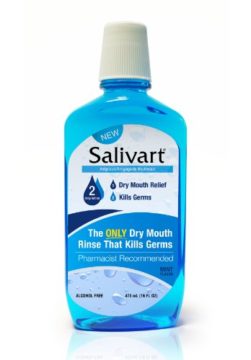 For temporary elimination Unpleasant sensations, it is recommended to use gels and sprays, which are intended for artificial moisturizing of the mucous membrane. For example, products such as Salivart and Aquoral.
For temporary elimination Unpleasant sensations, it is recommended to use gels and sprays, which are intended for artificial moisturizing of the mucous membrane. For example, products such as Salivart and Aquoral.
To eliminate dry mouth and other concomitant symptoms once and for all, you need to treat the underlying disease and take medications to normalize the function of the salivary glands. The course of therapy to eliminate the cause of the disease is selected individually. From dry mouth, you can take drugs to increase the resistance of the mucosa to irritants and local anti-inflammatory drugs.
Attention! Before using any medication, read the instructions and consult your doctor to avoid possible complications and side effects.
What can you do yourself
If dry tongue is due to external causes, change the environment:
- Reduce the temperature in the bedroom so as not to “overdry” the mucous membrane. You can fight the heat with an air conditioner or fan.
- Avoid dehydration. An adult should drink 2-3 liters of water per day. The norm for children from three to six years is 1–1.5 liters.For a child older than seven years - 1.5-2 liters.
- Balance your diet. Refuse snacks at night and dry, exclude foods with a lot of salt, sugar.
- Strengthen the immune system. Try to exercise in the fresh air, go in for sports and eat a balanced diet.
How to eliminate dryness: folk tips
 Drink plenty. You can use tea from chamomile, lemon balm or mint. Herbs have soothing, antibacterial and anti-inflammatory properties.
Drink plenty. You can use tea from chamomile, lemon balm or mint. Herbs have soothing, antibacterial and anti-inflammatory properties.- Do not deny yourself your favorite natural juices. But of all the varieties, it is better to drink orange or apple. They perfectly enhance immunity and enhance salivation.
- If dry mouth appears in the evening or the next morning, leave a glass of water with lemon juice or herbal tea by the bed. Before going to bed, you can suck on sugar-free candy. Rinse the mouth with olive, sea buckthorn or other vegetable oil.
- Eat more pineapples, grapefruits, hot chili peppers, lemon and cranberry juice. These products will help combat dry mouth.
The use of drug therapy and traditional medicine techniques will help to overcome xerostomia and normalize the natural pH of saliva.


